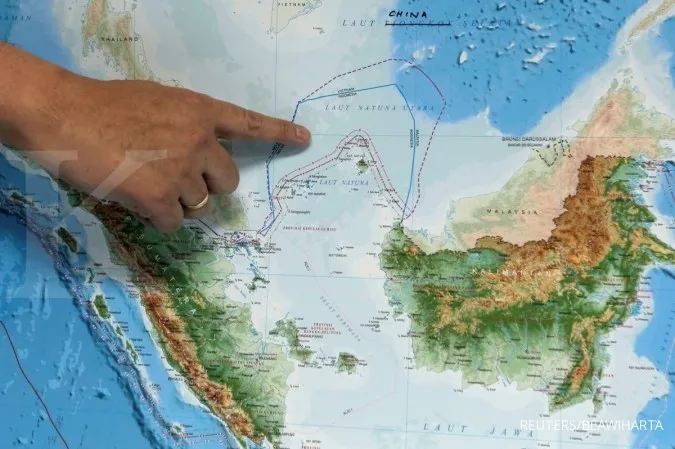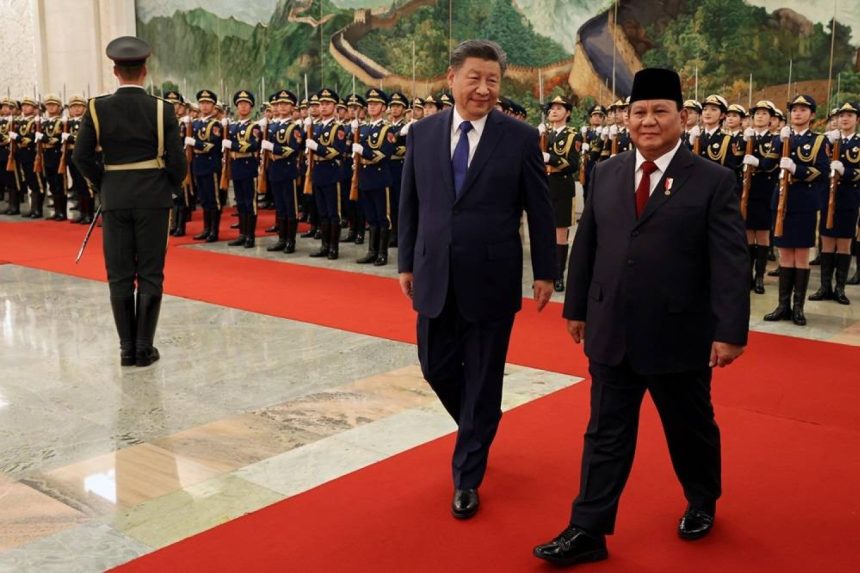Indonesia Rejects China’s South China Sea Claims Despite Maritime Agreement: Analysts Raise Sovereignty Concerns
Indonesia reiterated on Monday that it does not recognize China’s expansive claims over the South China Sea, even as it signed a maritime development deal with Beijing. The agreement, which involves joint cooperation in areas of overlapping claims, has raised concerns among analysts who fear it could undermine Indonesia’s sovereign rights in the region.
China’s claims over the South China Sea, based on its “nine-dash line,” have been a source of tension for years, especially with Southeast Asian nations that have competing territorial claims in the area.
The vast majority of the sea, including waters that fall within the exclusive economic zones (EEZ) of countries like Vietnam, the Philippines, and Malaysia, is claimed by Beijing. This has led to numerous confrontations over fishing rights, oil exploration, and military presence.
In 2016, an international tribunal ruled that China’s claims, based on its historical maps, have no legal standing in international law. Beijing rejected this ruling and continues to assert its dominance in the region, with its coast guard frequently patrolling disputed waters and clashing with neighboring countries.

During a visit to Beijing by Indonesian President Prabowo Subianto, a joint statement was issued outlining a new agreement between the two nations. This pact focused on maritime cooperation, including fisheries and fish conservation efforts in the region.
The agreement explicitly mentioned areas of overlapping claims, but Indonesia’s foreign ministry was quick to clarify that the deal would not affect the country’s sovereignty in the South China Sea.
READ ALSO: Trump’s Potential Return and Trade Tensions Loom Over COP29 Climate Summit in Baku
Indonesia has long maintained that it is a non-claimant state in the South China Sea. The country asserts that it has no territorial overlap with China in the area, particularly in the waters surrounding the Natuna Islands, which are part of Indonesia’s EEZ.
In a statement released on Monday, Indonesia’s foreign ministry emphasized that the agreement would have no impact on its sovereignty or rights to the North Natuna Sea. The ministry reaffirmed that Indonesia continues to reject China’s claims, describing them as having no basis in international law.
China’s foreign ministry responded to Indonesia’s position by highlighting the political consensus reached between the two countries, emphasizing their commitment to joint development in the overlapping maritime areas. Lin Jian, a spokesperson for the Chinese ministry, noted that both nations would continue to explore further cooperation, which would benefit both sides.
Beijing also reiterated that its South China Sea claims are based on historical maps, and that the agreement reflects a common understanding between Indonesia and China on these maritime issues.
China’s U-shaped line, which begins near central Vietnam and extends towards Indonesia’s Natuna Islands, is a point of contention in the region. The line cuts into the EEZs of several Southeast Asian countries, including Brunei, Malaysia, the Philippines, and Vietnam, and has been a flashpoint for tensions over resource exploitation and territorial control.

China’s coast guard is frequently accused of aggression, with reports of it harassing vessels from neighboring countries engaged in fishing and oil exploration activities.
While Indonesia has emphasized that the agreement does not alter its position on sovereignty, some analysts have raised concerns about the potential implications of the deal.
READ ALSO: Mpox: WHO to Provide Vaccination Support to Nigeria and 16 Other Countries
Aristyo Rizka Darmawan, a maritime analyst, argued that by signing the agreement, Indonesia could be seen as recognizing China’s overlapping claims in the region. This, he warned, could lead to the erosion of Indonesia’s rights to exploit resources in its EEZ.
Klaus Heinrich Raditio, a Chinese politics lecturer, shared similar concerns, calling the inclusion of the overlapping claims clause in the joint statement “inappropriate.”
He stated that Indonesia has never had overlapping territorial claims with China in the South China Sea, making the clause unnecessary and potentially harmful to Indonesia’s national interests. Raditio also suggested that the agreement could be renegotiated, given the risks it posed to Indonesia’s sovereignty.
Indonesia’s decision to sign a maritime agreement with China may be part of its broader strategy to strengthen economic ties with Beijing, especially in sectors like fisheries and fish conservation. The country has long sought to balance its economic interests with its commitment to protecting its sovereignty and rights in the South China Sea.
However, the joint statement’s reference to overlapping claims could complicate this delicate balance, particularly as China continues to assert its territorial ambitions in the region.

Indonesia’s position on the South China Sea will be closely watched by other Southeast Asian nations, many of which are also involved in disputes with China over the area. The country’s ability to maintain its sovereignty while engaging in economic cooperation with China will be a key factor in shaping future regional dynamics.
As the situation evolves, it remains to be seen how Indonesia will navigate the complexities of its relationship with China and other Southeast Asian nations, particularly in light of growing concerns about territorial integrity and resource exploitation in the South China Sea.

